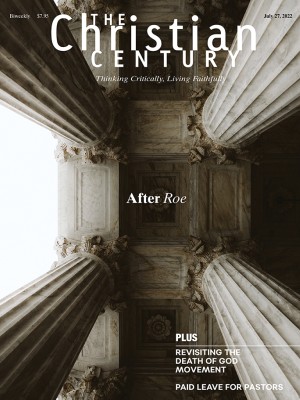Pastors, like everyone else, need paid family and medical leave
When I was diagnosed with cancer, I was shocked to find I had no paid leave or legal job protection.

“You have cancer.” These words ushered me into a wilderness of cancer treatment. The strengths and weaknesses of my sources of support—both personal and public—were exposed as my midlife identity shifted from competent caregiver to novice care receiver.
Prior to cancer, I saw the world through the eyes of the biblical character of Ruth, standing in the wilderness and pledging to care for her mother-in-law, Naomi. I was a care provider, and, as a pastor, I prided myself on my Ruth-like resourcefulness, diligence, and helpfulness to others. Now I was the one in need of care; I was Naomi. I resonated with her temptation to be bitter, her desire to go it alone, and her reluctant acceptance of help. I was humbled to hear family members and friends—as well as surgeons, oncologists, and radiologists—promise that wherever I went, they would go, too. Personally, I had support.
Read our latest issue or browse back issues.
Publicly, though, the sources of help for a clergy member in a medical crisis were murkier. I thought I knew my stuff. My professional background serving as chief operation officer for a hospice organization gave me ample knowledge about medical leave. As a researcher and writer, I had published many articles and even a book about the need for paid family leave, mandatory sick leave, and flextime on a state and federal level.
So I was shocked to learn that, as a pastor, I had no legal job protection and no access to paid or unpaid medical leave.
Many industrialized nations guarantee residents some amount of paid sick or medical leave. The only comparable policy in the United States is the Family and Medical Leave Act, which protects workers from being fired for taking up to 12 weeks of unpaid parental, medical, or family-care leave. In my wilderness of cancer care, I joined the millions of Americans who needed medical leave.
I also joined the ranks of those who fall through the cracks of our already meager system. To be eligible for 12 weeks of unpaid leave under FMLA, an individual must work for an employer with at least 50 employees within a 75-mile radius, have worked there for more than 12 months, and have put in at least 1,250 hours in the previous year. The first requirement precludes most congregations in mainline denominations, so the parish I serve was not legally bound to provide medical leave.
As the scheduled dates for surgery and chemotherapy treatments neared, I negotiated with our church council for a time of leave, which they generously gave. They envisioned my leave to include adjusting to the trauma of the previous months of doctor’s visits, diagnoses, tests, and life-and-death decision making. They hoped that I could focus on my health and my family so that I could return not only as their pastor but as a healthy child of God. The leave was paid, and the relief I felt was immense. I thought of the gracious character of Boaz, who was expansive and generous in his interpretation of the social safety net of his time—the practices of gleaning and levirate marriage—so that Ruth and Naomi could access the care they needed.
Our council’s decision was a gift, but family and medical leave should not rely on the generosity of individuals. After years of advocating for a federal paid family leave policy, I was humbled that I myself did not have a guaranteed way to access even unpaid leave. I was vulnerable, and I had to ask for help. I had both the privilege of professional experience in the area and the privilege of high trust with the congregation I serve. But what about pastors who are not as knowledgeable about leave or who find themselves in a contentious relationship with church leaders? The journey of care could have been a far more harrowing wilderness than it already was.
During my recovery last year, I joined the Families Valued Leadership Council of the Center for Public Justice. We were a cross-disciplinary, interdenominational group of Christians discerning a common-ground approach to paid family leave that might be championed by political leaders across ideological lines.
The time was ripe for our work because a proposal for a paid version of FMLA was included in the Build Back Better reconciliation bill, a proposal for leave that, along with being paid, would cover a larger swath of workers than the mere 56 percent FMLA covers now. This would include workers classified as self-employed (such as parish pastors) and gig workers (such as supply preachers). While the proposal aimed to benefit lower-income employees most, almost all workers would receive some percentage of wage replacement with their leave. While an employee would be free to access a state- or employer-specific leave policy if it was better than the federal one, the universal option would provide a safety net for the many workers who are not currently eligible for paid family and medical leave.
Build Back Better has been stalled since last fall, but our work has continued. In “Honoring Families, Loving Our Neighbors: A Common Ground Proposal for Paid Family Leave,” we articulated a policy vision to establish a universal benefit that gives new parents and end-of-life caregivers at least 12 weeks of time for dedicated caregiving and gives all workers at least two weeks of annual paid leave for meeting health and caregiving needs. These recommendations, while not perfect, establish a foundation for honoring families and neighbors in need of leave. Family-friendly policies are even more urgent in the wake of the Dobbs v. Jackson decision last month. According to the Centers for Disease Control and Prevention and the Guttmacher Institute, almost 75 percent of abortions take place because someone cannot afford to bear and raise a child.
At the end of the book of Ruth, Naomi looks back at the gracious work of God in her life and celebrates the gift of new life made possible, in part, by the social safety net of her time. On this side of treatment, I echo her joy and give thanks that paid time off made it possible for me to move beyond the lament of “You have cancer” and to hear: “You have support. You have time. You have care. You can heal. New life is possible.”
All of God’s people have the right to hear these words too.
A version of this article appears in the print edition under the title “Time to heal.”
Read "Getting to yes on paid family leave," an interview with Devon Anderson.
* * * * * *
Jon Mathieu, the Christian Century's community engagement editor, discusses this article and paid leave with the article's author Amy Ziettlow.





